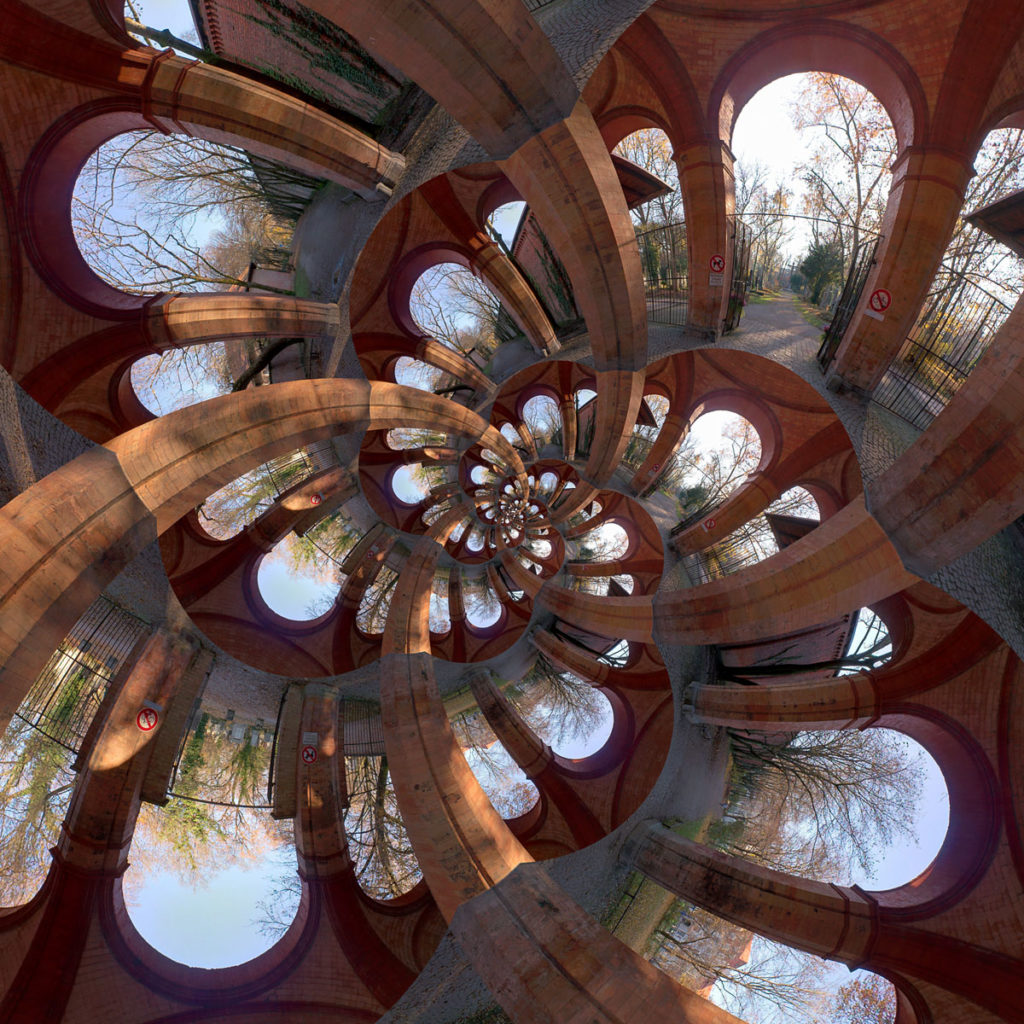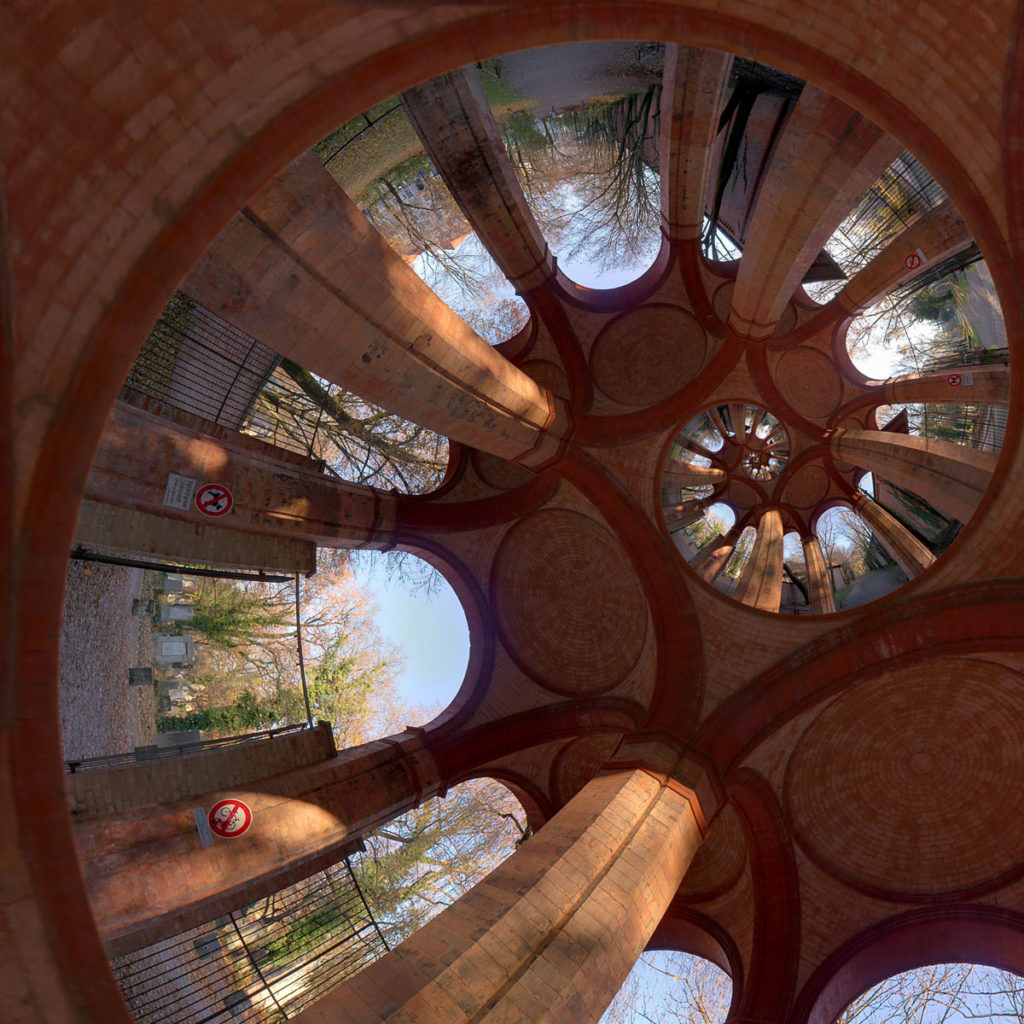This is from my 2019 calender either the March or the September page.
This Droste type reprojection was generated from a spherical panorama I took in the center of the entrance to Munich’s old south cemetery.

See the interactive version here.
This is the blog of the PanoTwins
Articles related to the Sony NEX 5 camera. This includes panoramas stitched directly with the camera (so called sweep panoramas) and panoramas stitched with PTGui.
This is from my 2019 calender either the March or the September page.
This Droste type reprojection was generated from a spherical panorama I took in the center of the entrance to Munich’s old south cemetery.

See the interactive version here.
This is from my 2019 calender either the March or the September page.
This Droste type reprojection was generated from a spherical panorama I took in the center of the entrance to Munich’s old south cemetery.

See the interactive version here.
Today I received my Sony adapter LA-EA4 and did a quick comparison with the older version LA-EA2. Both adapters add a translucent mirror to a NEX series camera and are built for the Alpha lens lineup. But the newer version LA-EA4 can also be used on the two new mirrorless full-frame sensor cameras with interchangeable lenses from Sony (the Sony A7r and Sony A7). The older version is only suitable for the Sony NEX series with APS-C sized sensors.
There is only a slight difference in weight (Sony LA-EA2 is 200g, the Sony LA-EA4 is 160g). Another difference is of course the size of the translucent mirror. The difference can easily be seen in the product shots. The speed of the autofocus seems to be the same (but I did no scientific test on that).
Both adapters work with the old “screwdriver” type autofocus lenses (Minolta 28-70/2.8 tested) and with the new SSM type autofocus lenses (Sony 70-200/2.8 tested). I did not test any SAM lenses. Both adapters work with my NEX-5 and also with the NEX-7.
With the NEX-5 I could only select a specific autofocus point with the old adapter. With the NEX-7 I could select a specific autofocus point with both adapters.


This panorama is a tribute to Joseph von Fraunhofer (* March 6, 1787 – † June 7, 1826) a German physicist and optician. He was born in Straubing and died in Munich. This panorama shows his tomb in Munich. I shot this panorama at his tomb almost eight years ago!
[pano file=”https://www.panotwins.de/wp-content/panos/MMatern_20121110_2879_FraunhofersTomb.xml” preview=”https://www.panotwins.de/wp-content/panos/MMatern_20121110_2879_FraunhofersTomb.jpg”]
 Show on map
Show on map
From the 85m high tower of Munich’s town hall you have a great view over the city centre. When you’re lucky you can even see the Bavarian alps in the distance. The tower can easily be ascend via elevator.
[pano file=”https://www.panotwins.de/wp-content/panos/MMatern_20121102_2633_RathausTurmHPoleNW.xml” preview=”https://www.panotwins.de/wp-content/panos/MMatern_20121102_2633_RathausTurmHPoleNW.jpg”]
 Show on map
Show on map
From the 85m high tower of Munich’s town hall you have a great view over the city centre. When you’re lucky you can even see the Bavarian alps in the distance. The tower can easily be ascend via elevator.
[pano file=”https://www.panotwins.de/wp-content/panos/MMatern_20121102_2605_RathausTurmHPoleSW_LDR.xml” preview=”https://www.panotwins.de/wp-content/panos/MMatern_20121102_2605_RathausTurmHPoleSW_LDR.jpg”]
 Show on map
Show on map
In 2012 the German Unity Day has been celebrated in Munich. The celebrations include a showcase of the German federated states (Bundesländer) and also other institutions like the parties of the Bavarian parliament. In the courtyard of the Bavarian Ministry of the Interior was an exhibition showing the many task of the ministry. This image shows a reprojected version of this panorama I made in the courtyard.
In 2012 the German Unity Day has been celebrated in Munich. The celebrations include a showcase of the German federated states (Bundesländer) and also other institutions like the parties of the Bavarian parliament. In the courtyard of the Bavarian Ministry of the Interior was an exhibition showing the many tasks of the ministry.
[pano file=”https://www.panotwins.de/wp-content/panos/MMatern_20121003_1858_TagDerDeutschenEinheitUeberBrunnen.xml” preview=”https://www.panotwins.de/wp-content/panos/MMatern_20121003_1858_TagDerDeutschenEinheitUeberBrunnen.jpg”]
 Show on map
Show on map
In a previous article I already described how to post-process images which were taken with ultra wide legacy lenses on a Sony NEX in order to eliminate the magenta cast in the corners. I use the free software cornerfix (which is available for Mac and PC).
In order to get the best results, you should create your own lens profiles. Therefore you can follow these instructions. I recommend a flat field reference file which is based on a picture through a matted glass panel.
But as you may not have such a glass panel at hands you can also download one of my profiles and give it a try.
If the profiles work for you, then please leave a comment or send a note.
The name of the alp you see here roughly translates to “Hindmost Colossus Alp”. It is found in the Retterschwang valley near Bad Hindelang. Cycling from Bad Hindelang brings you from 800m to the alp at 1451m in about 10km distance. You should use a mountain bike with the appropriate gears!
[pano file=”https://www.panotwins.de/wp-content/panos/MMatern_20120801_0071_Entschenalpe.xml” preview=”https://www.panotwins.de/wp-content/panos/MMatern_20120801_0071_Entschenalpe.jpg”]
 Show on map
Show on map